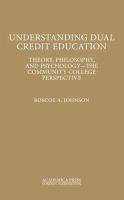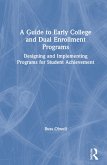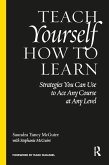Understanding Dual Credit Education: Theory, Philosophy, and Psychology - The Community College Perspective presents an incisive look at the increasingly popular academic program known as dual credit. The book lays out a thorough introduction to the scientific, psychological, and philosophical approaches to understanding human/student learning within the larger context of dual credit education. Built upon Roscoe Johnson's innovative empirical research findings of dual credit student academic performance at the community college level, Understanding Dual Credit Education presents an insightful philosophical argument for the implementation and maintenance of dual credit programming. The basic theoretical orientation of the book comes from Sweller's (1988) theory of cognitive load in student learning. The book traces the historical path of the philosophy of human learning, from Plato to the present, as well as the history of dual credit education in the United States. Since its initial inceptions, dual credit programming has been concerned with serving academically elite and gifted students in high school and allowing them the opportunity to receive early exposure to college level learning and credit. Although there have been many quantitative academic studies of dual credit students' academic performance, there have been virtually no attempts to explain the educational philosophy or psychology underlying this popular program offered in high schools today. Understanding Dual Credit Education does this and more. The first half of the book is written in accessible language for the layman reader. The remainder of the text contains more scholarly language addressing learning theory and educational statistics jargon. Tables containing quantitative research data findings on dual credit student academic performance are presented with accompanying explanations. Understanding Dual Credit Education is a valuable resource for administrators, policy-makers, community stakeholders, and educators who are currently responsible for, or considering implementing, dual credit programming on their campuses.
Hinweis: Dieser Artikel kann nur an eine deutsche Lieferadresse ausgeliefert werden.
Hinweis: Dieser Artikel kann nur an eine deutsche Lieferadresse ausgeliefert werden.








